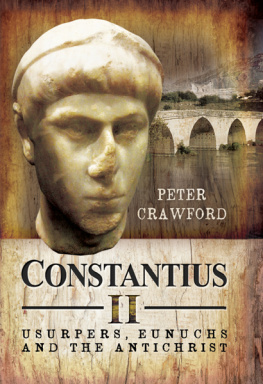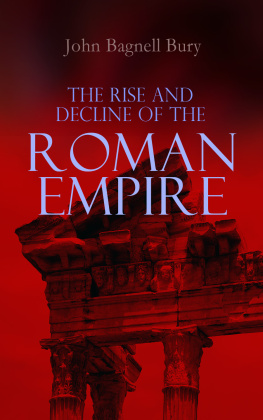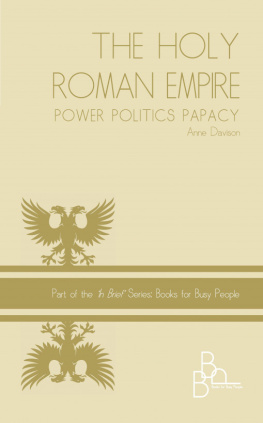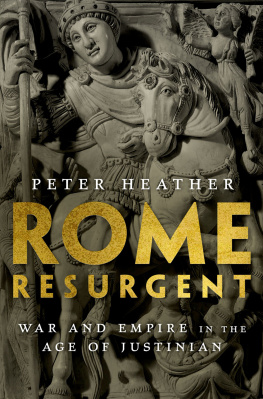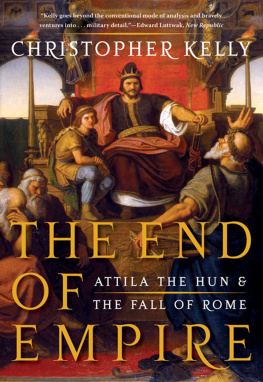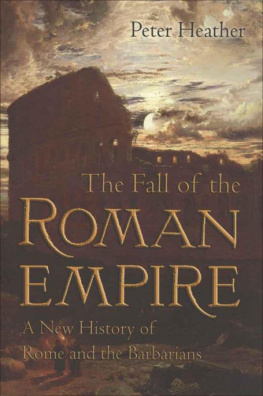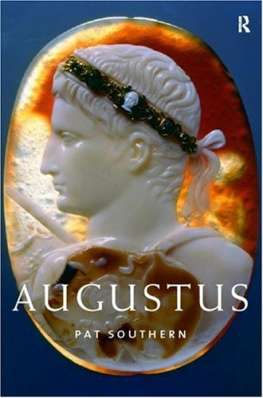Roman Emperor Zeno
We have two ears and one mouth, so we should listen more than we say.
Zeno of Citium (Diogenes Lartius,
Lives and Opinions of Eminent Philosophers , VII.23)
[I]n particular, I studied History, which adds flavour to moral instruction by imparting pleasurable knowledge of past events, spurring the reader by the accumulation of examples to follow the good and shun the bad.
William of Malmesbury, Gesta Regnum Angolorum II prol. I
Roman Emperor Zeno
The Perils of Power Politics in Fifth-century Constantinople
Peter Crawford
First published in Great Britain in 2019 by
Pen & Sword Military
An imprint of
Pen & Sword Books Ltd
Yorkshire Philadelphia
Copyright Peter Crawford 2019
ISBN 978 1 47385 924 1
eISBN 978 1 47385 926 5
Mobi ISBN 978 1 47385 925 8
The right of Peter Crawford to be identified as Author of this work has been asserted by him in accordance with the Copyright, Designs and Patents Act 1988.
A CIP catalogue record for this book is available from the British Library.
All rights reserved. No part of this book may be reproduced or transmitted in any form or by any means, electronic or mechanical including photocopying, recording or by any information storage and retrieval system, without permission from the Publisher in writing.
Pen & Sword Books Limited incorporates the imprints of Atlas, Archaeology, Aviation, Discovery, Family History, Fiction, History, Maritime, Military, Military Classics, Politics, Select, Transport, True Crime, Air World, Frontline Publishing, Leo Cooper, Remember When, Seaforth Publishing, The Praetorian Press, Wharncliffe Local History, Wharncliffe Transport, Wharncliffe True Crime and White Owl.
For a complete list of Pen & Sword titles please contact
PEN & SWORD BOOKS LIMITED
47 Church Street, Barnsley, South Yorkshire, S70 2AS, England
E-mail:
Website: www.pen-and-sword.co.uk
Or
PEN AND SWORD BOOKS
1950 Lawrence Rd, Havertown, PA 19083, USA
E-mail:
Website: www.penandswordbooks.com
Contents
Acknowledgements
Iwould like to give thanks to those who have contributed in some way to the production and publication of this work, many of whom are becoming part of an established team.
To Phil Sidnell and Pen & Sword for once again giving me the opportunity to write about Ancient History. My sincere apologies for the delays to this manuscript.
To Noble Numismatics for again granting me access to their excellent archive; to my sister, Faye Beedle, for making sense of my vague instructions and outlines to present such excellent maps and diagrams and to the artists and photographers whose images have been consulted and detailed within.
To Matt Jones and his team who turned that collection of photographs, diagrams and maps into this colourful tome.
To the online library of University College London and the staff of the History department for providing help and resources through 2016/2017.
To Dr John Curran for not only providing me with the encouragement to continue along this career path but also acting as a sounding board to bounce ideas off and a conduit for some weird and wonderful academic articles when other avenues were not so fruitful.
To all the staff, past and present, at Queens University, Belfast, and Dalriada School, Ballymoney, for all the time and effort you have put in to get me this far.
To all my predecessors and peers whose works have been consulted, digested and cited within. I hope to have done you all justice.
To all my friends, I promise that some of that home-brewed ale will be on the way soon I cannot promise it will be drinkable though!
To my grandparents for all their enquiries and questions about how my book is going. It is getting somewhere at last
And to Mum we finally got that bookcase installed, so the ceiling should not be caving in any time soon hopefully!
gratias vobis ago
Among those seeking power there is no middle ground except either triumph or complete failure.
Tacitus, Histories II.74
When you play the game of thrones, you win or you die. There is no middle ground.
Cersei Lannister in G.R.R. Martin,
A Song of Ice and Fire: A Game of Thrones, Ch.45
Introduction
A Roman Game of Thrones
Much like my previous literary outing on Constantius II, the seed of this work was planted during my PhD research on Late Roman Recruiting Practices. The section of my thesis which involved Zeno involved the military domination of Aspar, the increasing use and growing threat of the foederati and the Machiavellian paradigm of Roman recruiting in playing opponents off against one another. The prolonged preoccupation of Leo I and then Zeno with the Goths and Isaurians may have seen these barbarian groups become too much of a crutch for the eastern military of the late fifth century, perhaps displayed by the necessity of significant military reform under Anastasius after the migration of the Goths in 488 and the revolt of the Isaurians in 491. The very fact that Zeno, a supposedly semi-barbarian Isaurian, was able to become Augustus in the first place would also seem to present proof of the continued ability of the Roman Empire to integrate and Romanize foreigners despite the trials and tribulations it had faced through the fourth and fifth centuries.
Despite the intricate politicking surrounding Zeno, his seventeen-year reign is frequently reduced to the briefest of mentions as the emperor who was on the throne in Constantinople when the Western Roman Empire was consigned to the dustbin of history in 476. Indeed, the fifth-century eastern empire in general gets something of a limited press in favour of the collapse of the West, the domination of Attila the Hun and the Justinianic revanche of the 530s. This largely reflected the paucity of the sources and in particular the lack of a surviving secular historian between Ammianus Marcellinus and Procopius of Caesarea; however, as will be seen, there is plenty of information about the fifth century and Zeno. The accelerating growth of Late Antiquity as a subject all its own beyond Constantine, Theodosius and Justinian has seen areas such as the fifth century receive increasing attention. Some modern historians have found the reigns of Leo and Zeno to be particularly fruitful in terms of articles due to the lack of in-depth research on various aspects of the period, and there has been work focusing largely on aspects of Zenos reign. To my knowledge though, there has yet to be an extended look at Zenos entire life and reign in English, so a significant part of the inspiration for this book stems from wanting to help fill that gap.
There were other reasons for focusing on Zeno. Not only is there a personal interest in the emperor on the throne when the West fell, but Zeno was also one of the few Roman emperors to be forcibly removed from the throne only to regain it. His very (adopted) name, while recognisably Greek, has a strange, almost other-worldly feel to it in the English-speaking world ( Zen does literally mean King of All in Japanese). Perhaps it is the unfamiliar Z in the name of a Roman emperor that seems a little more exotic? While it was not in the forefront of my mind when I proposed Zeno as the subject of a book, it became impossible to ignore that at least on a subconscious level I had been drawn to this era through my interest in G.R.R. Martins A Song of Ice and Fire and the immense popularity of its TV adaptation, A Game of Thrones . The similarities between the affairs of the empires ruled from Constantinople and Kings Landing can be striking: multiple parties vying for control of the throne, political manipulation, military manoeuvrings, family in-fighting, regional conflict, usurpation and monarchs in exile, religious strife, repeated betrayals and broken alliances, all on a background of the barbarian other lingering at the fringes.


